The most popular herbs for scenting handmade soap include lavender for its calming properties, rosemary for its lasting woody scent, peppermint for cooling effects, lemongrass for citrus notes, chamomile and calendula for sensitive skin, sage and thyme for their cleansing qualities, rose for luxury, and eucalyptus for invigoration. You'll find these botanical additions not only impart wonderful aromas but also offer skin benefits from anti-inflammatory to antimicrobial properties. Discover how these natural ingredients can transform your soap crafting journey.
Lavender: The Timeless Aromatic Wonder
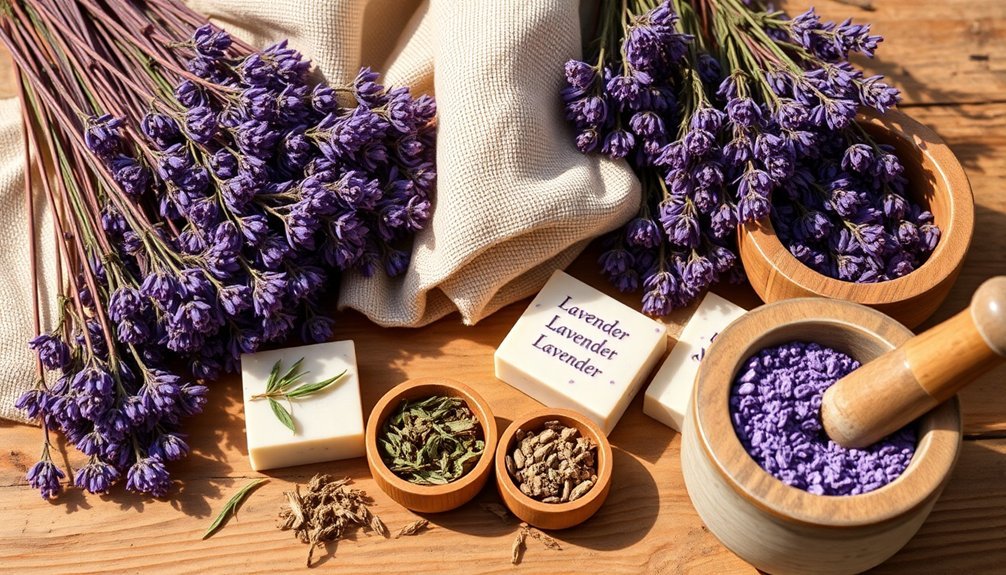
Three remarkable qualities make lavender the crown jewel of soap-making herbs.
First, its calming and relaxing properties transform your soap from a simple cleanser into an aromatherapy experience. When you incorporate lavender essential oil into your soap recipes, you're adding natural ingredients that offer both antimicrobial and anti-inflammatory benefits for various skin types.
Second, lavender buds create visual appeal while serving as gentle natural exfoliants. They add texture to your soap bars that delights both the eye and the skin.
Finally, lavender's distinctive floral scent effectively masks any unpleasant odors in your base ingredients.
Whether you choose dried buds or infused oils, lavender's versatility makes it perfect for crafters seeking to create soaps that clean, calm, and care for your skin simultaneously.
Rosemary: Mediterranean Scent With Staying Power
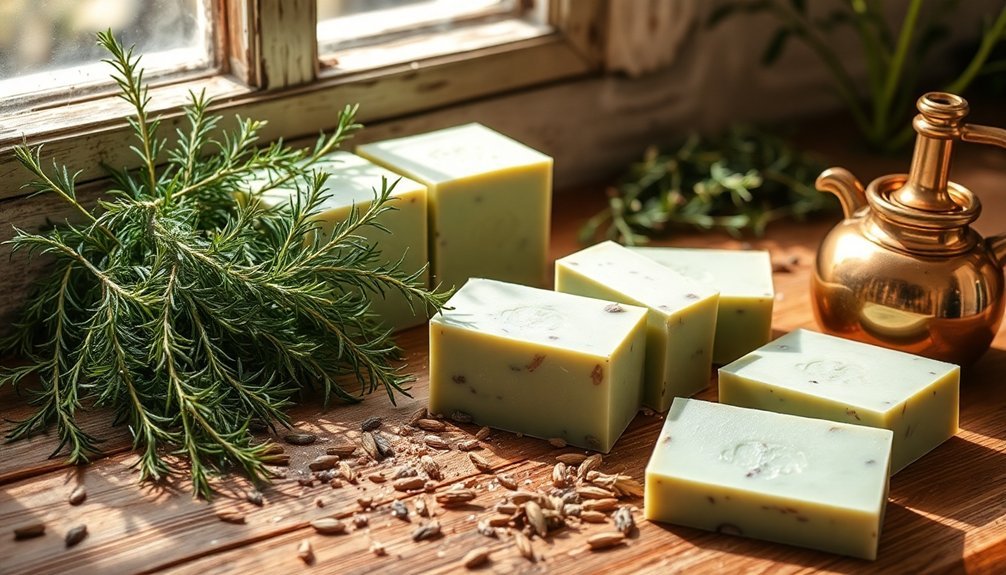
Rosemary stands as a powerhouse herb in the soap maker's arsenal, delivering both aromatic intensity and remarkable longevity. When you incorporate this Mediterranean herb into your handmade soap, you'll discover its woody, robust scent persists through curing and beyond.
You can add rosemary in multiple forms—dried leaves provide visual appeal, while its essential oils offer concentrated fragrance that doesn't quickly fade.
Beyond scent, rosemary brings therapeutic properties to your creations. Its natural antibacterial qualities enhance your soap's cleansing power, while high antioxidant content helps protect skin from environmental damage.
For soap makers seeking multi-functional ingredients, rosemary delivers on all fronts—aesthetic appeal, aromatic staying power, and skin benefits.
Whether infused in oil or added as essential oil, this versatile herb transforms ordinary soap into a sensory and therapeutic experience.
Peppermint: Cooling Infusion for Invigorating Soaps
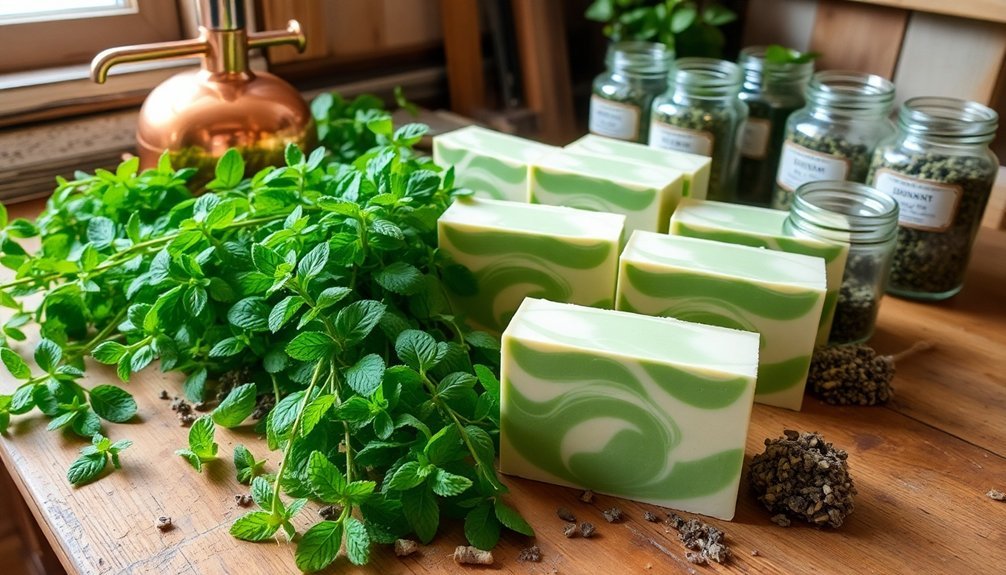
Peppermint's cooling sensation comes from its natural menthol content, which creates that distinctive tingle on your skin while providing antibacterial benefits during cleansing.
You'll find this versatile herb works wonderfully in morning wake-up bars, summer soaps, and seasonal holiday blends where its invigorating properties shine brightest.
Try combining your peppermint-infused oils with complementary scents like eucalyptus or citrus to create custom soap formulations that retain their rejuvenating aroma throughout the curing process.
Cooling Properties Explained
While many herbs impart only fragrance to handmade soaps, peppermint offers something extra—a delightful cooling sensation that transforms ordinary bathing into a truly invigorating experience. This unique quality comes from menthol, a natural compound in peppermint leaves that creates a revitalizing tingle when it contacts your skin.
- Your handmade soaps benefit from peppermint's cooling properties, especially in summer formulations.
- The menthol sensation awakens your senses while simultaneously calming irritated or red skin.
- You'll find peppermint particularly beneficial for post-workout cleansing routines.
- Your sensitive skin can experience relief from the gentle cooling effect.
- When you incorporate whole peppermint leaves, you'll enhance both the soap's appearance and its stimulating properties.
Creative Soap Applications
When designing peppermint-infused soaps, you'll discover countless creative applications that maximize its invigorating properties.
Try layering different concentrations of peppermint essential oil to create a soap with varying intensity levels—milder for the outer layer that touches skin directly, stronger in the core for sustained aromatherapy benefits.
You can also combine crushed peppermint leaves with other herbs like rosemary or lavender to develop complex scent profiles. The leaves serve as gentle exfoliants while adding visual appeal to your soap.
For a festive holiday bar, swirl in red clay with peppermint oil for a candy cane effect.
Remember to maintain proper dilution ratios—no more than 3% essential oil in your final product—to avoid potential skin irritation while still delivering that signature cooling sensation.
Lemongrass: Citrus Notes From Ancient Traditions
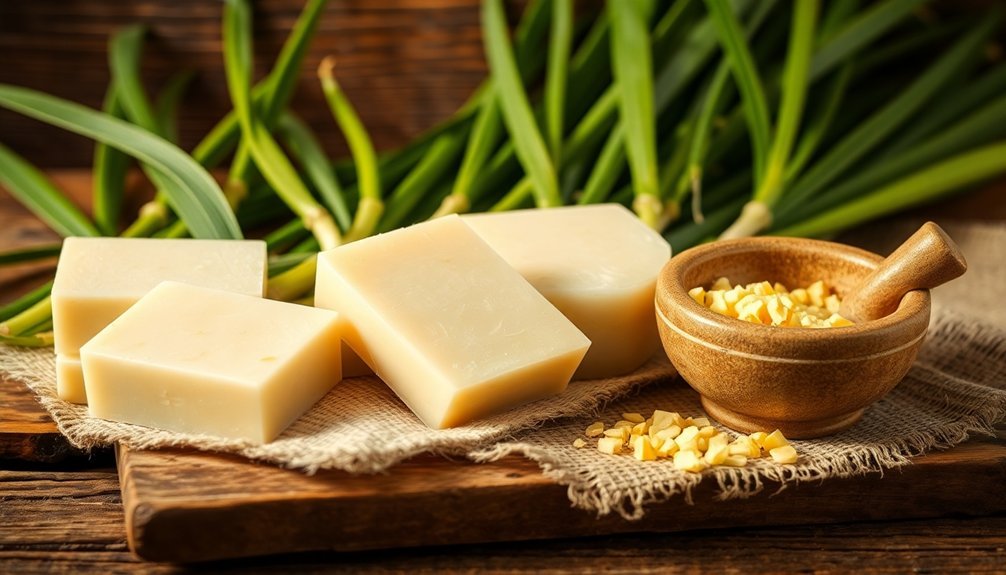
Revered for its invigorating citrus scent, lemongrass has graced traditional medicine cabinets and kitchens across Asia for centuries.
When you're crafting therapeutic grade natural soap, this versatile herb delivers both aesthetic appeal and beneficial properties.
- Infuses soap with a bright yellow-green color that enlivens your creation
- Contains citral, offering antimicrobial and anti-inflammatory benefits for skin
- Can be incorporated as dried leaves for texture or infused oil for stronger fragrance
- Provides mood-lifting effects that enhance your bathing experience
- Complements other ingredients while maintaining its distinctive citrus notes
You'll find lemongrass particularly valuable in natural soap making not just for its sensory appeal, but for its time-tested healing attributes.
The rejuvenating aroma transforms ordinary soap into a multisensory experience that connects you to ancient wellness traditions.
Chamomile: Gentle Floral Essence for Sensitive Skin
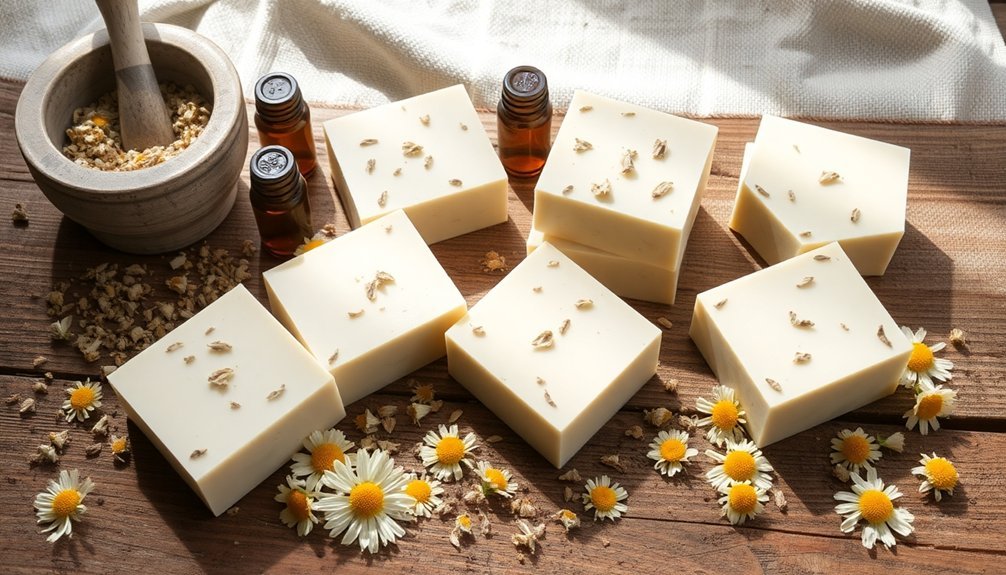
Chamomile's gentle floral essence creates a subtly fragrant soap you'll appreciate for its delicate aroma that never overwhelms the senses.
You'll find its skin-soothing properties especially beneficial if you're crafting soaps for sensitive skin types, as the herb naturally reduces redness and irritation.
Whether you choose to incorporate dried chamomile flowers or its essential oil, you're adding both therapeutic benefits and a calming scent that transforms your handmade soap into a spa-like experience.
Skin-Soothing Infusion Properties
Among the botanical treasures available to soap makers, chamomile stands out as a powerhouse of skin-soothing benefits wrapped in a delicate floral aroma. When you're crafting homemade soap, infusing chamomile can transform your creation into a therapeutic skin treatment suitable for all skin types.
- Reduces inflammation and redness, making it perfect for irritated or sensitive skin
- Contains powerful antioxidants that protect against environmental damage
- Improves skin hydration and elasticity for a more youthful appearance
- Provides relief for chronic skin conditions like eczema and dermatitis
- Delivers aromatherapy benefits through its calming scent
The soothing properties of chamomile are most effective when properly infused into carrier oils before soap making.
You'll notice the difference in how your skin feels—calmer, less irritated, and naturally balanced after using chamomile-infused soap.
Delicate Aroma Appeal
The gentle scent of chamomile offers more than just therapeutic benefits—it creates an exquisite sensory experience in your handmade soaps.
You'll find its delicate aroma persists throughout the curing process without overwhelming other scents, making it perfect for complex herbal blends.
Chamomile flowers can be incorporated whole as decorative elements or ground into a fine powder mixed directly into your soap batter.
Either way, you're adding both visual appeal and the flower's renowned anti-inflammatory properties.
What makes chamomile particularly valuable is its versatility—the subtle floral notes complement virtually any soap recipe while providing genuine skin benefits.
This balance of fragrance and function is especially appreciated by those with sensitive skin, who can enjoy a pleasantly scented product without risking irritation.
The natural antibacterial qualities further enhance its appeal as a practical aromatherapeutic addition.
Eucalyptus: Respiratory-Enhancing Herbal Classic
Widely celebrated for its distinctive medicinal aroma, eucalyptus stands as a cornerstone in respiratory-focused soap making. When you're crafting handmade soap, eucalyptus essential oils deliver powerful natural antibacterial properties while creating a cooling sensation that's perfect for post-workout relief.
- Clears congested airways while you shower, transforming your bathroom into a spa-like sanctuary
- Creates an invigorating, mood-lifting experience that combats mental fatigue
- Provides natural cleansing through its antibacterial and antifungal qualities
- Delivers a cooling effect that's especially welcome during hot weather
- Enhances focus and concentration through its proven aromatherapy benefits
You'll find eucalyptus particularly valuable for seasonal soaps designed to combat winter stuffiness or summer heat – its versatility makes it a timeless addition to your soap-making ingredient list.
Calendula: Golden Petals With Subtle Fragrance
Calendula's golden petals infuse your handmade soap with natural healing properties that soothe irritated skin while providing antiseptic benefits.
You'll find these vibrant flowers create stunning visual interest when sprinkled directly into your soap batter, adding both color and texture to the final product.
For maximum skin-nourishing effects, try infusing calendula into your base oils before soap-making, which enhances the moisturizing qualities while preserving the flower's subtle, pleasant fragrance.
Natural Healing Properties
While many herbs contribute scent to handmade soap, golden calendula petals offer both delicate fragrance and remarkable therapeutic benefits. When you incorporate these calendula flowers into your soaps, you're adding natural healing properties that work wonders for your skin.
- Calendula's anti-inflammatory properties soothe irritated skin, making it perfect for sensitive complexions.
- The natural color of these golden petals adds aesthetic appeal without artificial additives.
- Antioxidant-rich petals support moisture retention, combating dry skin effectively.
- When infused in oils, calendula promotes tissue repair and can minimize scar appearance.
- The gentle antiseptic qualities help cleanse while protecting your skin's natural balance.
You'll find calendula's healing properties particularly beneficial for everyday use, as they work to nurture your skin while providing a subtle, pleasing aroma that complements other natural scents.
Bright Soap Decoration
Beyond their therapeutic value, the golden petals of calendula transform handmade soap into visually stunning creations that catch the eye and delight the senses. When you're using your soap making kit, you'll find these vibrant flowers retain their color remarkably well throughout the saponification process.
You can add calendula petals whole on top of your soap for dramatic decoration, or finely chop them into your soap batter for an integrated, textured appearance. Their warm, inviting hue complements any design while imparting a subtle, pleasant fragrance.
The beauty of calendula extends beyond aesthetics—these petals contain antiseptic properties that enhance your skin care routine. For those with sensitive or irritated skin, calendula-infused soap offers both a feast for the eyes and a gentle, soothing cleanse.
Oil Infusion Benefits
Four remarkable benefits emerge when you infuse calendula petals into carrier oils for your handmade soap. The solar method—steeping dried petals for 4-6 weeks—efficiently extracts calendula's therapeutic properties into your chosen carrier oil.
- Creates a visually appealing golden hue that naturally colors your soap
- Provides anti-inflammatory and antiseptic qualities that calm irritated skin
- Enhances overall sensory experience with its delicate, non-overpowering aroma
- Promotes deep hydration and skin repair for all skin types
- Particularly beneficial for sensitive skin conditions that need gentle care
Calendula oil stands out among herbs for soap making because it combines aesthetic appeal with practical skincare benefits.
You'll appreciate how this botanical infusion transforms ordinary soap into a nourishing treatment while delivering a subtle, pleasant fragrance that complements other essential scents.
Sage: Cleansing Herb With Centuries of Use
Among the many herbal additives for soap making, sage stands out as a cleansing herb with deep historical roots. Its centuries-old reputation for purification spans cultures worldwide, making it a perfect addition to your handmade soap creations.
When you incorporate sage into your soaps, you're harnessing natural oils rich in antibacterial and antifungal properties that benefit the skin.
You'll find that sage imparts a distinctive earthy aroma that's both invigorating and calming—appealing to customers seeking authentic natural scents.
You can add this cleansing herb in multiple forms: sprinkle dried leaves for visual interest and gentle exfoliation, or use sage-infused oils to capture its beneficial properties more thoroughly.
Either way, including sage enhances your soap's appeal to consumers increasingly drawn to holistic, herb-based products with traditional wellness backgrounds.
Rose: Luxurious Floral Scent From Garden to Bath
When you incorporate roses into your handmade soaps, you're drawing upon one of nature's most beloved fragrances to create a truly luxurious bathing experience. The skin-soothing properties of rose petals offer more than just a pretty face in your soap—they deliver genuine benefits.
- Dried rose petals add visual appeal while providing gentle exfoliation.
- Infusing petals into your base oils captures their essence before soap-making begins.
- Rose essential oil elevates your soap with anti-inflammatory properties.
- The luxurious floral scent promotes emotional well-being and reduces stress.
- Both the petals and oils work together to create a calming, spa-like experience.
Whether you're sprinkling petals on top or infusing them throughout, roses transform ordinary soap into an extraordinary sensory ritual that pampers both skin and spirit.
Thyme: Earthy Aromatics With Antiseptic Properties
Ancient healers treasured thyme for its medicinal properties, and today's soap makers can harness this powerful herb's benefits in their creations.
When you incorporate thyme into your handmade soap, you're adding more than just an earthy aromatic—you're infusing your bars with natural antiseptic properties from thymol, a compound that helps cleanse and protect skin.
You can use thyme in multiple forms: dried sprigs provide decorative elements, while infused oils capture its essence throughout your soap.
The herb's robust scent pairs beautifully with lavender or citrus oils, creating complex fragrance profiles that elevate your soap's sensory appeal.
Beyond its delightful aroma, thyme's antibacterial qualities make it functional as well as fragrant.
Your handmade soap becomes both a pleasure to use and beneficial for skin health.
Frequently Asked Questions
What Herbs Are Good for Homemade Soap?
You'll find calendula petals, chamomile flowers, lavender buds, eucalyptus leaves, and lemongrass ideal for homemade soap. They'll add natural colors, soothing properties, and pleasant fragrances while benefiting your skin.
How to Add Scent to Homemade Soap?
To add scent to homemade soap, you'll want to incorporate essential oils at trace, infuse carrier oils with herbs beforehand, or blend in dried botanicals. Don't overdo it—a little fragrance goes a long way.
How Do You Infuse Herbs in Soap?
You'll infuse herbs in soap by soaking dried plants in carrier oil using either the solar method (4-6 weeks in sunlight) or stove-top method (gentle heating below 140°). Add the infused oil during trace stage.
How Long Does Homemade Soap Need to Cure?
Your homemade soap needs to cure for 4-6 weeks. During this time, store it in a cool, dry place with good air circulation. Longer curing makes your soap harder and improves its quality.
In Summary
You've discovered ten remarkable herbs that'll transform your soap-making journey. Whether you're drawn to lavender's calming embrace or peppermint's invigorating bite, these time-tested botanicals offer both fragrance and benefits. Don't hesitate to combine them for unique signature blends. Your handcrafted soaps will stand out with these natural scents that have delighted people for centuries. Trust nature's aromatic palette—it won't disappoint.
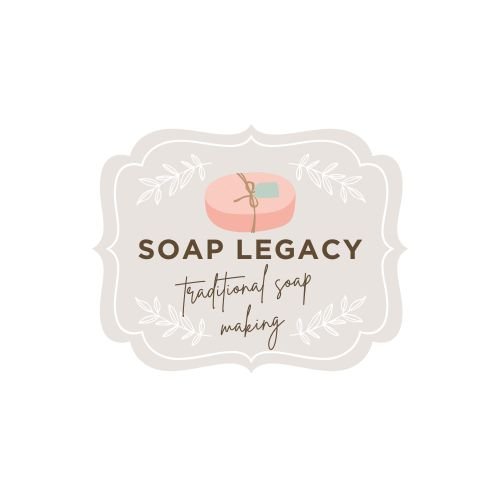
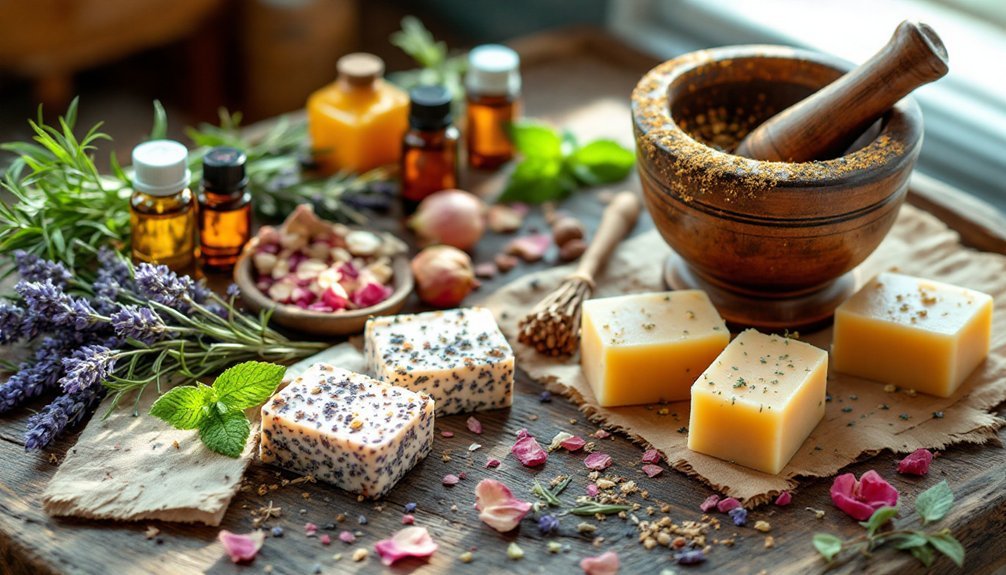
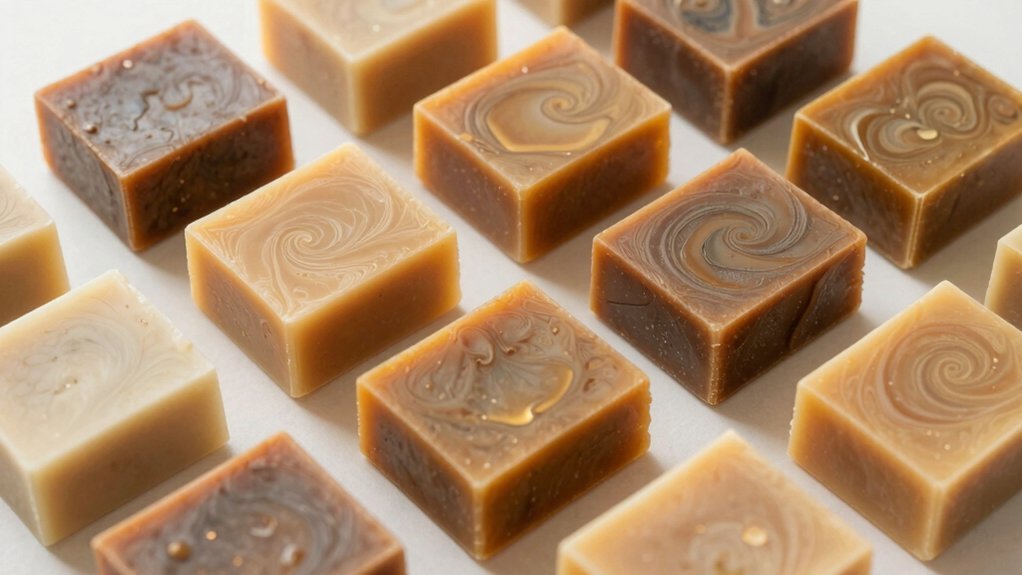
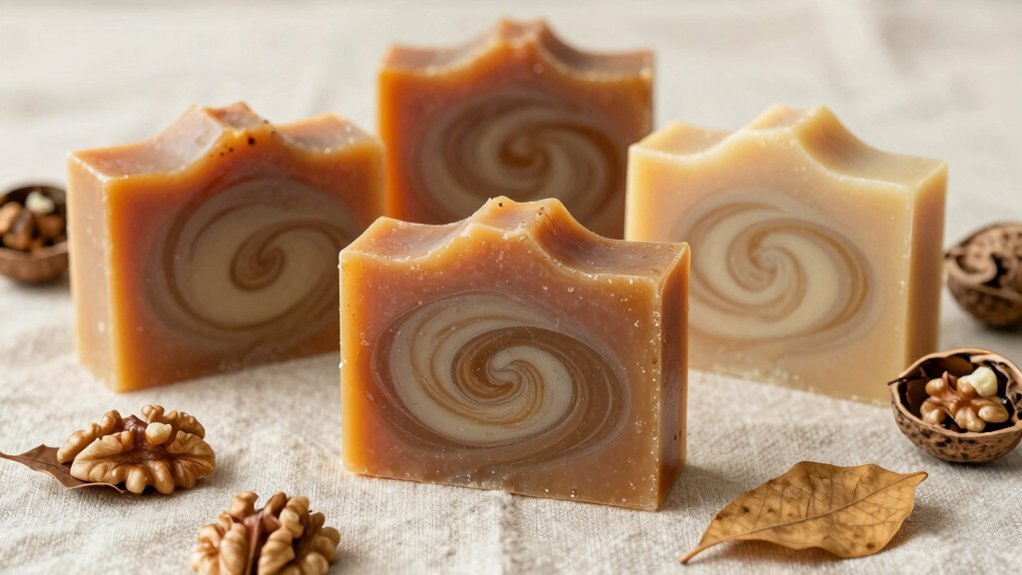
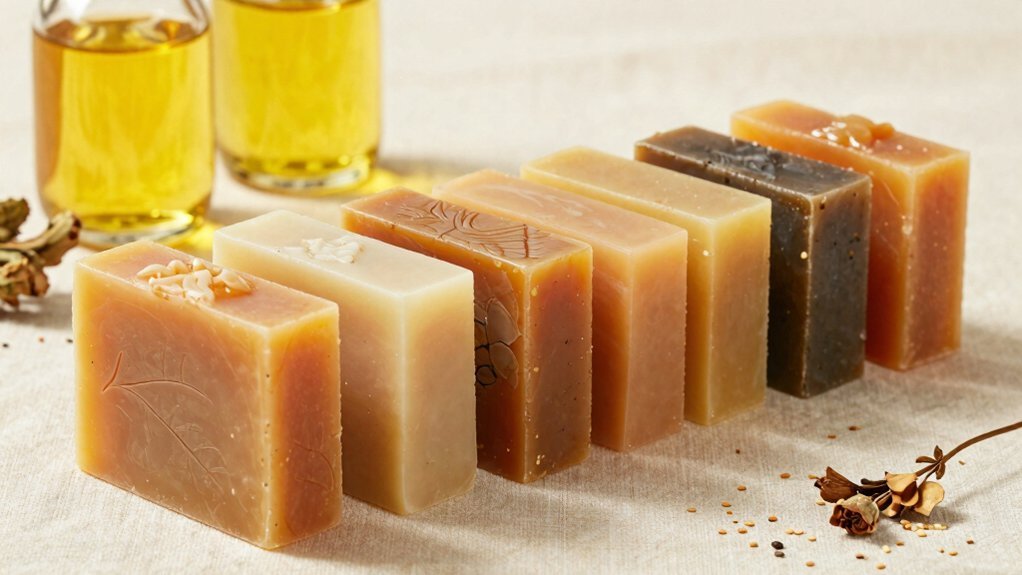
Leave a Reply